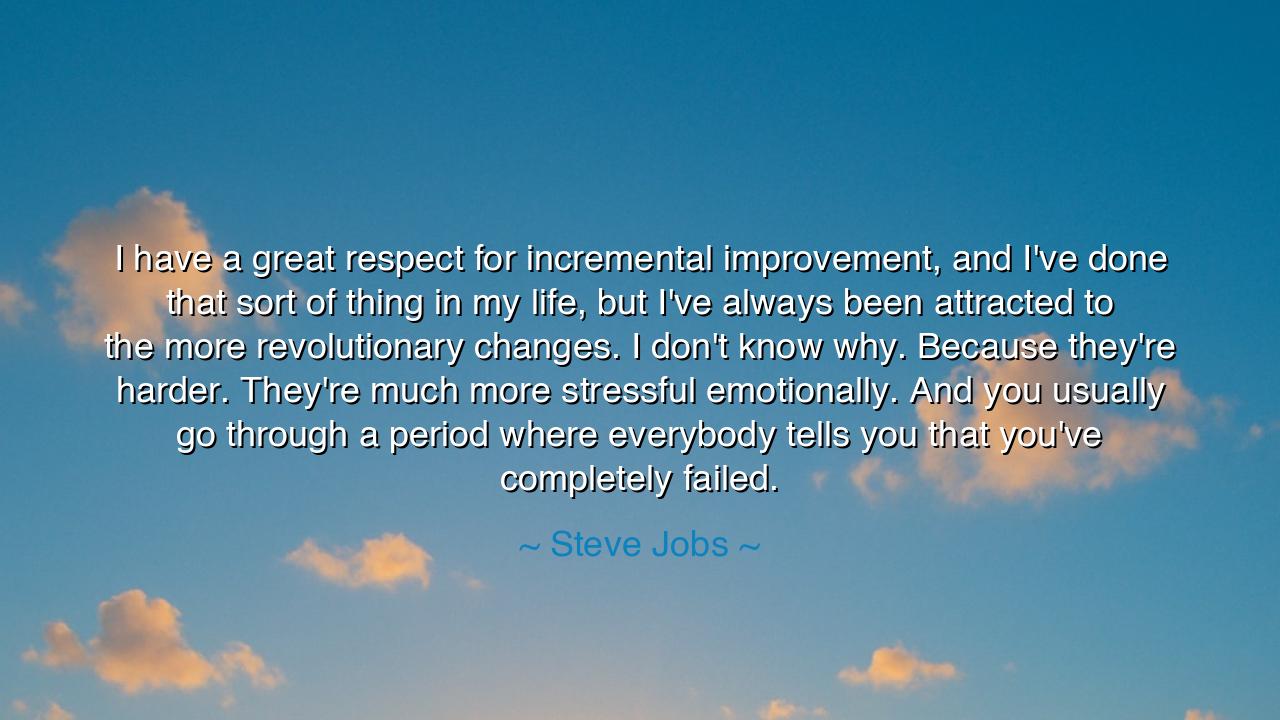
I have a great respect for incremental improvement, and I've done
I have a great respect for incremental improvement, and I've done that sort of thing in my life, but I've always been attracted to the more revolutionary changes. I don't know why. Because they're harder. They're much more stressful emotionally. And you usually go through a period where everybody tells you that you've completely failed.






“I have a great respect for incremental improvement, and I’ve done that sort of thing in my life, but I’ve always been attracted to the more revolutionary changes. I don’t know why. Because they’re harder. They’re much more stressful emotionally. And you usually go through a period where everybody tells you that you’ve completely failed.” Thus spoke Steve Jobs, and in these words is a vision not only of invention, but of the eternal struggle between comfort and daring. For the world often honors the steady step, the cautious progress, the small repair. But it is the leap, the storm, the bold upheaval that shakes the earth and opens new destinies.
The ancients knew this rhythm of creation. In times of peace, the plow and the chisel shaped their days, and incremental improvement gave them harvest and craft. Yet in times of great change, a single vision would rewrite the fate of nations. Moses leading his people from Egypt, Alexander striking east to conquer Persia, Gutenberg carving letters into movable type—these were not mere refinements, but revolutions that split time in two. Incrementalism preserves; revolution transforms. Jobs, like the heroes of old, sought not only to polish the stone but to break it open and reveal the fire inside.
Consider his own tale. When the world was satisfied with clumsy machines and lifeless screens, Jobs envisioned the Macintosh, the iPod, the iPhone. Each was not a small correction but a revolutionary change that reshaped how men and women touched knowledge, music, and one another’s voices. Yet at each step, he was told he had failed. Investors turned their faces, critics scorned his visions, even his own company cast him aside. Still he returned, bearing within him the flame of the revolutionary. For he understood that to endure the storm of ridicule is the price of forging something new beneath the sun.
This is the burden of the visionary. Incremental improvement is safe, welcomed, and rarely opposed. It is the careful addition of stones to a wall already standing. But to call for revolutionary change is to threaten the very order of things. People will resist you, for they fear the unknown more than they hate the imperfect. They will call you mad, they will name you reckless, they will say you have failed. Yet history shows that those who endure this exile, who hold to their vision, often become the architects of a new age.
O children of the future, learn well from this teaching: honor the humble craft of incremental improvement, for it trains the hand and steadies the heart. But do not despise the call of boldness when it comes to you. When the vision burns in your mind and will not let you sleep, do not turn away because it is harder. For the harder path is often the one that leads beyond the walls of the known into the wide fields of destiny.
The lesson is this: greatness requires courage to be misunderstood. If you would walk the path of revolutionary change, be ready for loneliness, for doubt, for the voices that declare you ruined. But know also that these trials are the forge of transformation. What feels like failure may be the very beginning of victory, hidden until its appointed hour.
Therefore, take these actions into your life: when you labor in the small, do it with excellence. When you are called to the great, do it with courage. Do not shrink from difficulty, nor surrender to the chorus of doubters. If the change you seek is true, it will endure beyond the moment, and the world will one day recognize what it once rejected.
So I say unto you: be both craftsman and visionary. Respect the steady hand that improves the present, but follow the fiery heart that dares to reimagine the future. For it is through both, and especially through the courage of revolutionary change, that mankind ascends from what is to what might be. And though the world may first cry “failure,” time will name you its prophet.






AAdministratorAdministrator
Welcome, honored guests. Please leave a comment, we will respond soon